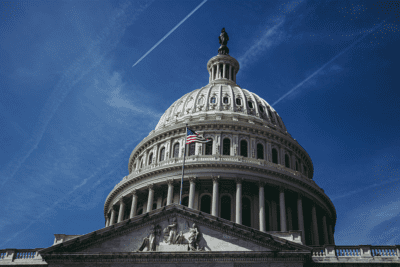
JFF Urges Passage of the FY23 Spending Bill
December 21, 2022
At a Glance
JFF urges members of the 118th Congress to build on the bipartisan progress made on the Fiscal Year 2023 Omnibus Appropriations bill when they convene in January and to collaboratively develop solutions that enable our systems to complex and rapidly shifting needs of learners and workers.
Jobs for the Future applauds U.S. House and Senate negotiators for reaching consensus this week on legislation that would fund the federal government for the coming year. We are especially encouraged to see bipartisan support for increased funding of vital education, workforce development, and child care programs, even though more is needed.
JFF urges members of the 118th Congress to build on this bipartisan progress when they convene in January and collaboratively develop solutions—including additional funding where urgently needed—that enable our systems to meet the complex and rapidly shifting needs of learners and workers.
The House and Senate must each pass the Fiscal Year 2023 Omnibus Appropriations bill—or a short-term spending bill—by Friday, December 23, to avoid a government shutdown.
We are especially encouraged to see bipartisan support for increased funding in vital education, workforce development, and child care programs, even though more is needed.
The appropriations bill includes the following FY23 funding increases for key education and skills development programs:
- A $100 million increase in career and technical education, for a total of $2.2 billion, including $25 million for Innovation and Modernization Grants
- A $50 million increase in state grants funded through the Workforce Innovation and Opportunity Act, for a total of $2.9 billion
- A $25 million increase in adult education, for a total of $729 million
- A $15 million increase in community college training that leads to quality jobs and careers in in-demand industries (Strengthening Community College Training Grant program), for a total of $65 million
- A $50 million increase in Registered Apprenticeships, for a total of $285 million
- A $13 million increase in job training and preparation for people reentering the community after incarceration (Reentry Employment Opportunities program), for a total of $115 million
While the bill reflects a continued commitment to key education and workforce programs, this legislation is not sufficient to fully address the needs of millions of learners and workers who face systemic barriers to education and quality jobs.
Negotiators also agreed on several key provisions to better support students from low-income backgrounds, including a $500 increase to the maximum Pell Grant award for college tuition, a nearly $2 billion increase to the Child Care Development Block Grant, and a $10 million increase the Child Care Access Means Parents in Schools program.
While the bill reflects a continued commitment to key education and workforce programs, this legislation is not sufficient to fully address the needs of millions of learners and workers who face systemic barriers to education and quality jobs. Additional funding is essential to meet the promise of the new jobs created by passage of the Infrastructure and Jobs Act, the CHIPS and Science Act, and the Inflation Reduction Act.
Related Content

The Workforce Innovation and Opportunity Act of 2022 Increases Resources, Advances Equity, and Modernizes Our Systems
Movement of this legislation would expand and improve services to America’s jobseekers, workers, and employers.

Bold Ideas for Rethinking Education and Workforce: A Transition Policy Memo to the Biden Administration
As President-elect Joe Biden and Vice President-elect Kamala Harris prepare to take office, JFF’s nonpartisan policy team has put together a transition memo with recommendations for the incoming administration. The suggestions we put forth are…

JFF Applauds House Passage of Build Back Better Act
Senate must act quickly on this important legislation to provide Americans with the supports they need to get back to work.

Seven Ways to Improve TANF and Help Families Advance
JFF and APHSA say fresh policy strategies and innovative state practices can strengthen TANF and workforce development systems.

Policy & Advocacy
We are advancing evidence-based policy to enact changes in the education system and the workforce. Nearly half of U.S. workers are in low-paying jobs. Systemic issues in education, employment, and workforce development prevent millions of…
